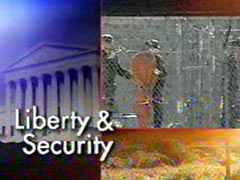 |
||
|
 |
||||||||||||
|
||||||||||||
 |
|||||||||||||||||||||||||||||||||||||||
|
|||||||||||||||||||||||||||||||||||||||
|

|
The Media vs. The
War on Terror By Rich Noyes, MRC
Research Director Executive Summary
Unfortunately, the broadcast networks are using this Bush-bashing spin as the starting point for much of their coverage of the War on Terror. An analysis by the Media Research Center finds network reporters are presuming the worst about the government’s anti-terror efforts, and permitting their coverage to be driven by the agenda of leftist groups such as the ACLU and the Center for Constitutional Rights. While some on the Left have claimed the media were enthusiastic boosters of the Bush administration in the days after 9/11, the MRC found that network reporters began to question the idea of a vigorous War on Terror within days of the attacks. MRC analysts analyzed 496 stories that aired on ABC’s World News Tonight, the CBS Evening News, and NBC Nightly News between September 11, 2001 and August 31, 2006. They examined all evening news stories about three major elements of the post-9/11 war on terrorism: the treatment of captured terrorists at Guantanamo Bay (277 stories); the National Security Agency’s program to eavesdrop on suspected terrorists calling to or from the U.S. (128 stories); and the USA Patriot Act (91 stories). Major findings: ■ Most TV news stories about the Patriot Act (62%) highlighted complaints or fears that the law infringed on the civil liberties of innocent Americans. This theme emerged immediately after the law was first proposed in September 2001, less than a week after the 9/11 attacks. Only one report (on NBC) suggested the Patriot Act and other anti-terrorism measures "may not be enough." ■ ABC, CBS and NBC heavily favored critics of the Patriot Act. Of 23 soundbites from "experts" (such as law professors or ex-FBI agents), 61 percent faulted the law as a threat to privacy rights. Of 19 soundbites from ordinary citizens, every one condemned the Patriot Act, despite polls showing most Americans support the Patriot Act and believe it has prevented new acts of terrorism. ■ Most of the network coverage of Guantanamo Bay focused on charges that the captured al-Qaeda terrorists were due additional rights or privileges (100 stories) or allegations that detainees were being mistreated or abused (105 stories). Only 39 stories described the inmates as dangerous, and just six stories revealed that ex-detainees had committed new acts of terror after being released. ■ Network reporters largely portrayed the Guantanamo inmates as victims, with about one in seven stories including the word "torture." The networks aired a total of 46 soundbites from Guantanamo prisoners, their families or lawyers, most professing innocence or complaining about mistreatment. Not one report about the Guantanamo prisoners included a comment from 9/11 victims, their families or lawyers speaking on their behalf. ■ Most network stories (59%) cast the NSA’s post 9/11 terrorist surveillance program as either legally dubious or outright illegal. Exactly half of the news stories (64) framed it as a civil liberties problem, while 38 stories saw the President provoking a constitutional crisis with Congress and the courts. Only 21 stories (16%) focused on the program’s value as a weapon in the War on Terror. ■ ABC, CBS, and NBC were five times more likely to showcase experts who criticized the NSA’s surveillance program. Of 75 total soundbites, 41 of them (55%) condemned the program, compared to just eight (11%) from experts who found it worth praising. The CBS Evening News has so far refused to show any pro-NSA experts. The debate is not about whether reporters can challenge a president and his
policies during a time of war. Of course they can. But the networks have chosen
to highlight the complaints of those who paint the Bush administration as a
danger equal to or greater than the terrorists themselves. Reporters could have
spent the past five years challenging the administration with an agenda most
Americans share, demanding that the government do everything within its lawful
powers to protect the public and prevent another attack. Instead, liberal
reporters have opted to join the ACLU in fretting that the War on Terror has
already gone too far. |
|
The Media Research Center For an interview with an MRC Spokesman, please contact Tim Scheiderer at (703) 683-5004
Home | News Division
| Bozell Columns | CyberAlerts |





 In the
five years since al-Qaeda terrorists killed nearly 3,000 Americans on September
11, 2001, both international critics and domestic groups such as the American
Civil Liberties Union have suggested that the American government’s tactics in
the War on Terror are as frightening as terrorism itself. These mostly liberal
critics portray the Bush administration as trampling on the civil rights of
ordinary Americans, abusing the human rights of captured terrorists and acting
without regard to the rule of law.
In the
five years since al-Qaeda terrorists killed nearly 3,000 Americans on September
11, 2001, both international critics and domestic groups such as the American
Civil Liberties Union have suggested that the American government’s tactics in
the War on Terror are as frightening as terrorism itself. These mostly liberal
critics portray the Bush administration as trampling on the civil rights of
ordinary Americans, abusing the human rights of captured terrorists and acting
without regard to the rule of law.